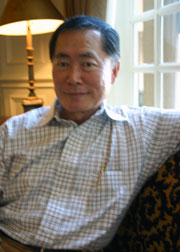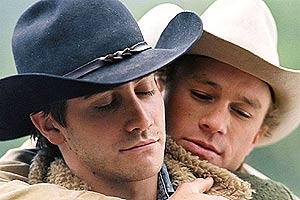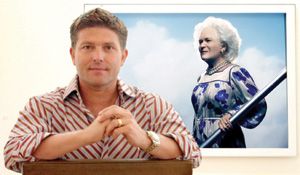The name "Duff" reminds me of the beer that Homer Simpson drinks. Her actual name: Karen Duffy seems to suit her better.
Dig if you will the picture:
Duff, the goddess of the 30 second attention span, in her downtown Manhattan apartment, wearing something like a simple pair of black platform high heels and a sensible black suit. She's got Ernest Borgnine looking over her, as she tries to finish saying her rosary while keeping the weight of her priorities in perfect balance. When she runs out of breath from unpacking her suitcase and hanging up some new additions to her satanic-looking art collection, she sits down, kicks off her heels, relaxes to some Sinatra, and exhales, knowing that she has kept her equilibrium intact. Indeed.
March 30, 1993
Duff called me from her dressing room at the MTV Studios in New York City.
SPREAD: I saw you this morning on MTV interviewing Chuck Norris.
DUFF: I've never even seen that show that I do.
SPREAD: Really? Have you ever watched yourself on MTV?
Duff: Hardly ever. Actually, I didn't have MTV for... well, I never had it. But I got a job on MTV about a year and a few months ago. It took me another three months to get cable because New York is all backed up, but I didn't pay my cable bill so they shut it off. I think it would drive me mad to watch it.
SPREAD: Where were you when you heard Elvis died?
Duff: Well, I was only a little kid and I was with my grandfather -- who's kinda like Thurston Howell III. I remember we were at a pool. That was like 1976-77, right? So I was just a little kid swimming at somebody's pool and my grandfather told me. He broke the news.
SPREAD: If you were a hooker, what kind of hooker would you be?
Duff: I don't know. That's kind of an interesting question. I don't think... Lets see... I'm trying to think of a way to turn this into a fishing kind of answer. I'd be a hooker way out in Nantucket.
SPREAD: What won't you do on MTV?
Duff: Kiss anybody's butt. They've this whole cheesy thing about how "The New Music Revolution is going to be Televised." I think that's the biggest pile of malarkey I've ever heard. So I refuse to do that, and I refuse to be sycophantic. I'm always stepping on people's toes. Not that I'm intentionally being mean, but I just feel like "Gee, great video. Sorry about the song." I dunno, I'm always getting in trouble. I usually open up my evening show by saying that "MTV is a termite in the timber of integrity." And we're always asking the question, "Will we have to wait until the day that Dolly Parton sleeps on her stomach to see an inspiring video?"
SPREAD: Biting the hand that feeds you?
Duff: Yep.
SPREAD: Will you be on MTV forever?
Duff: Nope. I mean, I feel really lucky to be on MTV. I made a cheeseball, $2.00 production of me being a VJ and sent it in. So this all happened pretty suddenly. I've got other things in the works, and Hey! Anybody who reads this Ñ send in an audition tape! We really need good people Ñ I wanna be in good company.
SPREAD: What films have you worked on?
Duff: Well, most recentlyÑI had a cameo in Last Action Hero, which is a Schwartzenegger movie, I worked on Who's the Man. I've worked on two Woody Allen films.
SPREAD: Which ones?
Duff: Husbands and Wives, and Alice.
SPREAD: Who did you play in Alice?
Duff: I played a secretary. He shoots so many different scenes, so it's not really anything to toot my horn about. But the fact that I've worked with him a few times has been great. I also worked on 29th Street. I've done about half a dozen films.
SPREAD: Which films have you turned down?
Duff: I've walked away from a couple of things that really kinda cheesed women out. Right now I've got a picture deal with a studio Ñ so they're giving me scripts and I can kinda choose which ones I wanna do. And I'm just in the process of that. So I'm really not ya know big enough to be turning stuff down. I haven't really been offered that much, its just getting rolling now.
SPREAD: Are there any plans for a big singing-n-dancing career?
Duff: Hell no! I've got Van Gogh's ear for music Ñ the one he chopped off. And when I dance, I look like a dying gangster with flailing appendages. No. Not at all. I don't dance, don't sing, don't watch MTV. (laughs)
SPREAD: What's hanging on the walls of your apartment?
Duff: Well, nothing right now because it's being painted. But I travel all the time for MTV, so I've been buying art. Like really satanic scary art. I was just in Utah for the NBA All Star Game and I got this really satanic pumpkin oil-painting. When I'm on tour with a band or whatever, I like to check out little galleries or local art. I've got a big picture of Ernest Borgnine because I just won an Ernest Borgnine look-alike contest. My best friend and I dressed up as a two-headed Ernest Borgnine from McCale's Navy and we gave a dramatic recitation from his award-winning film Marty. I have those pictures, plus gold records from my boyfriend [Whitfield Crane from Ugly Kid Joe] because he doesn't have a house.
SPREAD: What do you mean when you say satanic art?
Duff: Scary-looking, like, really primitive. Mark Kostabi the artist, he made me two beautiful paintings 'cuz I interviewed him Ñ which was awesome. The best thing about MTV is the swag that you accumulate, and Kostabi makes these original paintings while you're talking and then flips them over. And I like to just buy a lot of quirky thrift store art.
SPREAD: So whatcha reading?
Duff: This book by Paul Fussell called Class, and there's another book called Head Hunting In the Solomon Islands Around the Coral Sea by Caroline Mytinger, who's a physical anthropologist. They're non-fiction.
SPREAD: As an Irish Catholic, what did you think of the whole Sinead O'Connor incident on Saturday Night Live?
Duff: I was there! I was there in the audience and it rocked my world! I gotta tell you Ñ when she did it (ripped-up a picture of Pope John Paul II), she was freaking! It wasn't like she did it with a whole lota conviction. She was trembling, and everyone just shut the hell up. No one laughed for the rest of the night. Then after every Saturday Night Live, there's big hootenanny at some big bar. And it was soooo down. On Sunday I felt really bombed. It really hurt me. All day I just couldn't forget what had happened. It rocked my world. The next week I was at the Bob Dylan tribute where she got booed. So that thing has had a lingering effect.
SPREAD: I'm really glad she did it for a whole bunch of different reasons. I just think she has a different perspective as an catholic from Ireland.
Duff: But that whole night, just crashed! Everybody was freaked!
SPREAD: Do you remember when the cast from Saturday Night Live did the SPIN issue?
Duff: Yeah
SPREAD: Well, I found it strange that the cast were surprised that Sinead O'Connor did that on live television. I think that you would sort of expect that sort of thing from her because she's so outspoken. But it's upsetting that they re-aired it, and showed the taped rehearsal of her song instead of what really went out over the air. It'll be the 3rd most remembered moment in TV history, next to the shooting of Lee Harvey Oswald, and Crispin Glover trying to kick David Letterman in the head. But I could understand it bringing the whole evening down.
Duff: It was, you didn't expect it at all. The way she did it, she was freaking and trembling, and her voice was quivering. Ya know how it is, when you're rude to somebody and you don't really mean it? That feeling that you're like "Oh my god!" That was what it was like.
SPREAD: Do you still go to church?
Duff: Yep.
SPREAD: How often?
Duff: I'd say every Sunday, and I usually try to go once or twice mid-week.
SPREAD: Wow! Dedicated.
Duff: I try. I try to say the rosary every day too. I also have my little novenas, and candles. I visit a nursing home three times a week -- so it's a big Catholic thing I'm lugging around.
SPREAD: If you won the lottery would you quit working?
Duff: I'd quit MTVÑbut I can't Ôcuz I'm under contract. No, I wouldn't. Because before I was working MTV, I was working at a nursing home -- I didn't have any money. And now: 10 movies, 30 commercials, a TV pilot, and a movie deal Ñ I'm my bank account is a lot fatter. Nothing's changed. I'd definitely keep working, because you just fall apart. You gotta keep yourself inspired. I wouldn't necessarily punch a clock. But I would definitely be developing projects.
SPREAD: Name three good music videos.
Duff: Faith No More's "I'm Easy", Guns-n-Roses "Garden of Eden." Boy, you asked for three? I didn't mind Green Jello's "Three Little Pigs" -- the song sucks, but the video is cool. Actually I liked Ugly Kid Joe's new one "Busy Bee". The thing is about Ugly Kid Joe is their music is actually better than it sounds.
SPREAD: You mean "live" than what gets out on album?
Duff: Yeah.
SPREAD: What effect did you think MTV had on the '92 presidential election?
Duff: I think we have to grovel to get voters. I think MTV got a lot of people to vote -- younger people because they were guilted into it. I hope that the people who did go ahead and vote, thought about issues rather than just having a knee-jerk reaction to "Choose or Lose, Choose or Lose, Choose or Lose. I think Tabitha Soren did a great job by having President Clinton on MTV, as well as Ross Perot. I think it opened people's eyes and really hit a lot of people. At the inauguration President Clinton said thank you to MTV. If it wasn't for MTV, he thought he wouldn't've be there. I was just in Washington last week, and there was this big "hoity-toity" Horatio Alger event that I was co-hosting with Maya Angelou. Ross Perot, Gerald Ford, and even Jack Kemp said, 'I wanna be on MTV,' so certainly people are paying attention.
SPREAD: What was one of your biggest mistakes?
Duff: God they're million of 'em. After I graduated from the University of Colorado. I lived in Washington, D.C. for a year and a half. It was the worst year and a half of my life! Stay away from D.C.! It was too conservative. If you have any amount of passion they think that you're crazy. It was a miserable time. I regret that.
SPREAD: Who are three of your favorite celebrities?
Duff: Tom Jones, Frank Sinatra, and Ernest Borgnine.
SPREAD: What do you use in your hair?
Duff: (laughs) I just came back from Bora Bora, so I use this Tahitian coconut oil that all the natives stick in their hair.
SPREAD: What advice can you give from the wealth of your experiences?
Duff: My dad gave me some good advice: he said, "Life is like the three rings of a Ballantine Ale can. One ring represents your family and friends. One ring represents your spiritual life. And one represents your professional life. You should keep all rings the same size and in balance so you'll stay a balanced person. But if you throw too much focus on your career, or your boyfriend, or blind religious abandon -- then boom! You just gotta keep equal amounts of focus on each one of 'em.




















